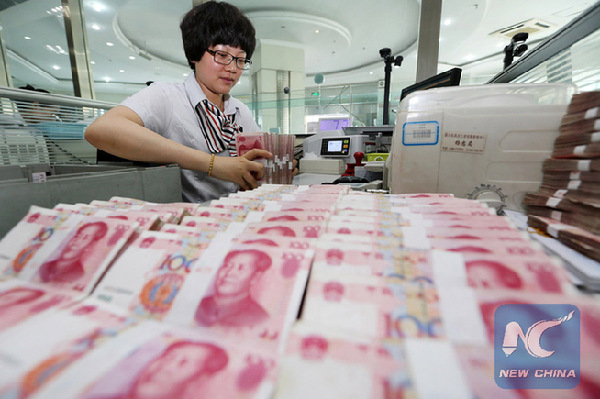Yuan internationalization good for global currency stability
- By Abduel Elinaza in Johannesburg
 0 Comment(s)
0 Comment(s) Print
Print E-mail China.org.cn, December 3, 2015
E-mail China.org.cn, December 3, 2015
|
|
|
The file photo shows a bank employee arranges Chinese currency Renminbi (RMB). [Xinhua] |
China's yuan internationalization should benefit investors and traders and the international community as a whole, since it opens more room for maneuver in the benchmark currency basket.
On Monday, the International Monetary Fund (IMF) agreed to add the yuan (known in China as the renminbi) to its special drawing rights (SDR) basket alongside U.S. dollar, euro, pound sterling and the Japanese yen.
Professor Garth Shelton of the University of Witwatersrand in South Africa said the internationalization of the yuan is a good move to balance uncertainty over currency reserves.
"I think it's good," Shelton said. "I think it is good for everyone, including the U.S."
For import and export traders, he said, the move will have a positive impact in giving them more room for currency hedging, removing dollar dependency.
"The value of a dollar (main trade currency for most African countries) can fluctuate without notice, thus affecting ordinary consumers", but the yuan may provide much-needed balance, Shelton said.
"It's like an individual putting all money into one bank or stock in one company…Normally, we tend to have more than one account and buy different stocks."
His assumption is based on simple economics, since Sino-African trade has been increasing every year. Last year, it reached US$220 billion.
Peter Kagwanja, CEO of the Nairobi-based Pan African think-tank the Africa Policy Institute, said China's investments in Africa have fuelled the continent's current economic boom.
"Today, an estimated 800 Chinese corporations are doing business in Africa. These are mainly private companies investing in the continent's infrastructure, energy and banking sectors," said Kagwanja.
With China's new industrial relocation policy gathering momentum, whereby Tanzania is chosen as a pilot country, yuan dependence is increasing over time.
Zhou Yuxiao, former ambassador to Zambia, said capacity transfer may need to be tried out first in a few countries that are willing and are better prepared.
"Ethiopia, Kenya and Tanzania are said to have been chosen for that reason," Zhou said.
Fresh data shows the trade volume between Tanzania and China reached US$2.31 billion in the first half of this year.
This suggests the two countries are on track to achieve a new high for the whole year, considering that the total amount last year was US$4.32 billion, an amount China believes is far from enough.







Go to Forum >>0 Comment(s)